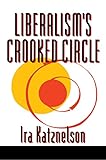Liberalism's Crooked Circle : Letters to Adam Michnik / Ira Katznelson.
Material type: TextPublisher: Princeton, NJ : Princeton University Press, [1998]Copyright date: ©1996Edition: Course BookDescription: 1 online resource (212 p.)Content type:
TextPublisher: Princeton, NJ : Princeton University Press, [1998]Copyright date: ©1996Edition: Course BookDescription: 1 online resource (212 p.)Content type: - 9780691004471
- 9781400821860
- 320.5/1
- JC574 .K37 1996
- online - DeGruyter
- Issued also in print.
| Item type | Current library | Call number | URL | Status | Notes | Barcode | |
|---|---|---|---|---|---|---|---|
 eBook
eBook
|
Biblioteca "Angelicum" Pont. Univ. S.Tommaso d'Aquino Nuvola online | online - DeGruyter (Browse shelf(Opens below)) | Online access | Not for loan (Accesso limitato) | Accesso per gli utenti autorizzati / Access for authorized users | (dgr)9781400821860 |
Browsing Biblioteca "Angelicum" Pont. Univ. S.Tommaso d'Aquino shelves, Shelving location: Nuvola online Close shelf browser (Hides shelf browser)

|

|

|

|

|

|

|
||
| online - DeGruyter Paolo Giovio : The Historian and the Crisis of Sixteenth-Century Italy / | online - DeGruyter Arendt and Heidegger : The Fate of the Political / | online - DeGruyter Why the Wealthy Give : The Culture of Elite Philanthropy / | online - DeGruyter Liberalism's Crooked Circle : Letters to Adam Michnik / | online - DeGruyter Spies without Cloaks : The KGB's Successors / | online - DeGruyter My Own Private Germany : Daniel Paul Schreber's Secret History of Modernity / | online - DeGruyter The Psychology of Kundalini Yoga : Notes of the Seminar Given in 1932 / |
Frontmatter -- CONTENTS -- PREFACE AND ACKNOWLEDGMENTS -- INTRODUCTION: THE CLUB OF THE CROOKED CIRCLE -- ONE. "La lutte continue" -- TWO. The Storehouse of Power and Unreason -- Index
restricted access online access with authorization star
http://purl.org/coar/access_right/c_16ec
This book is a profoundly moving and analytically incisive attempt to shift the terms of discussion in American politics. It speaks to the intellectual and political weaknesses within the liberal tradition that have put the United States at the mercy of libertarian, authoritarian populist, nakedly racist, and traditionalist elitist versions of the right-wing; and it seeks to identify resources that can move the left away from the stunned intellectual incoherence with which it has met the death of Bolshevism. In Ira Katznelson's view, Americans are squandering a tremendous ethical and political opportunity to redefine and reorient the liberal tradition. In an opening essay and two remarkable letters addressed to Adam Michnik, who is arguably East Europe's emblematic democratic intellectual, Katznelson seeks to recover this possibility. By examining issues that once occupied Michnik's fellow dissidents in the Warsaw group known as the Crooked Circle, Katznelson brings a fresh realism to old ideals and posits a liberalism that "stares hard" at cruelty, suffering, coercion, and tyrannical abuses of state power. Like the members of Michnik's club, he recognizes that the circumference of liberalism's circle never runs smooth and that tolerance requires extremely difficult judgments. Katznelson's first letter explores how the virtues of socialism, including its moral stand on social justice, can be related to liberalism while overcoming debilitating aspects of the socialist inheritance. The second asks whether liberalism can recognize, appreciate, and manage human difference. Situated in the lineage of efforts by Richard Hofstadter, C. Wright Mills, and Lionel Trilling to "thicken" liberalism, these letters also draw on personal experience in the radical politics of the 1960s and in the dissident culture of East and Central Europe in the years immediately preceding communism's demise. Liberalism's Crooked Circle could help foster a substantive debate in the American elections of 1996 and determine the contents of that desperately needed discussion.
Issued also in print.
Mode of access: Internet via World Wide Web.
In English.
Description based on online resource; title from PDF title page (publisher's Web site, viewed 30. Aug 2021)


